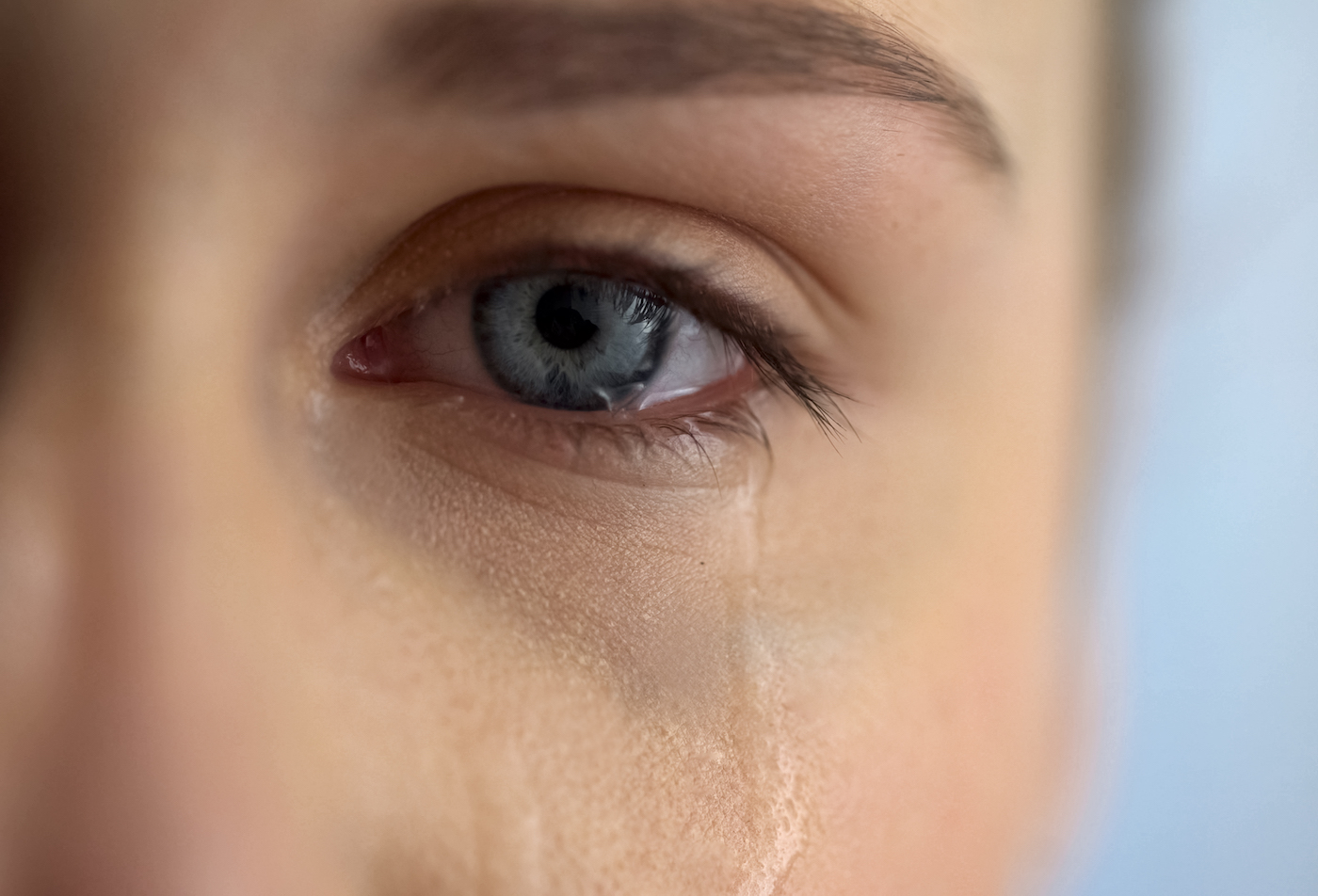
February 21, 2020 at 01:00PM by CWC
A while back, I showed my parents a video of a baby moved to happy tears by his mother’s singing. This baby was just about like the purest, roundest, squishiest, cutest angel I’d ever seen, and his tears moved me to tears. And then my dad. My stoic mom stayed dry-eyed, but I digress. What’s good news for me, my dad, and this internet baby is that there are some real, tangible benefits of crying.
Sure, for some, crying may conjure a sense of weakness, or feel embarrassing, or reflect being hyper-emotional. The people who feel that way, though, could stand to learn a lot about the benefits of crying, including the different reasons the biological function happens at all and when it might be cause for medical concern. Below, educate yourself on the little-known complexities of shedding a tear, and why doing so might just be good for you.
Before we get into the benefits of crying, why do we shed tears anyway?
Often the reason we cry is involuntary, depending on the type of tears you’re shedding. According to the American Academy of Ophthalmology, there are three types of tears, each of which serves its own purpose.
ADVERTISEMENT
ADVERTISEMENTSports Direct Free Delivery on All Orders! |
- Basal tears: This is a protein-rich liquid that your eye ducts secrete in order to lubricate your eyeball. These aren’t the emotive, streaming-down-your face type of tears, but rather an involuntary protective shield for your eyes against dirt and other irritants.
- Reflex tears: You shed reflex tears happens when your eyes are actively fighting against irritants like smoke, raw onions, allergens, or any other sort of personalized environmental annoyance to your system. Reflex tears wash out the bacteria and harmful materials.
- Emotional tears: These are tears triggered by any emotional stimuli—good, bad, or puppy in a cup. Yes, they can be inconvenient at times, but they do serve a purpose as well.
4 benefits of crying
1. Crying helps to acknowledge and confront your emotions
Controlling our emotions isn’t about actual control so much as regulating our feelings by allowing ourselves to feel them, when appropriate, and then responding thoughtfully and mindfully. Since crying is feeling, it can help us learn and introspect about our emotional makeup.
“When we cry, we release pent-up feelings such as fear, anxiety, stress, frustration, and anger,” says clinical psychologist Carla Marie Manly, PhD. “Crying is one of the many ways that the mind clears itself of stored feelings and energy.”
ADVERTISEMENT |
2. Crying can provide calm when you’re in fight-or-flight mode
Sometimes a crying fit may be a result of anxiety, panic, or other states of distress. In this case—and ideally once you’re physically in a safe and comforting place—crying it out can beneficial. “After the stressful event has passed, crying can allow the body and mind to release the stored energy and ultimately return to a state of calm,” Dr. Manly says.
3. Crying can boost your mood
You know how sometimes all you need is five minutes in the bathroom stall to have a full-scale meltdown? And once you’ve had this intense crying session, you just feel so much better—like you’re finally able to confront the rest of your day and whatever it is that feels particularly overwhelming about it? That’s because crying is sometimes exactly what you need in order to get through a given moment. It’s why you shouldn’t be ashamed of crying at work (although discretion may be advised if sensitivity is stigmatized in your office).
“Sometimes a person cries when they are alone in order to relieve stress, self-soothe, and release stress,” Dr. Manly says. Crying in this way can allow the body and mind to find release, a restored sense calm, and perhaps even a boosted mood.
4. Crying can alert others that you could use some help
“Social-soothing is also a factor when we cry in the presence of others,” Dr. Manly says. “Crying is often an unconscious plea for social connection and support; when caring people respond to one’s tears, the effects can be powerfully healing. Crying in front of those who are supportive can be very cathartic, freeing, and validating.”
To that end, sometimes crying in front of someone is less of a cry (a…ha) for help and more of a display of affection. In these cases of happy tears, crying boosts social connection and alerts someone of the depth of your gratitude, for say, having sent you flowers or having offered words of affection.
When to see a doctor
Sure, there are clear benefits of crying that communicate its healthy spot as a biological function we all exercise. But, unrelenting crying may be a sign of a bigger issue at play.
“Sometimes people with severe depression can’t stop crying, and it’s painful,” says psychiatrist Judith Orloff, MD. “This may be a symptom of a biochemical imbalance or emotional needs that require a good, compassionate psychiatric evaluation. People must seek professional help if crying is prolonged over weeks or months, except if someone is grieving, say, the loss of a loved one. Tears are natural and healing during grief, and grief can turn into depression if one’s emotions are not expressed.”
ADVERTISEMENT

ADVERTISEMENT
Anya Hindmarch - I AM A PLASTIC BAGFurthermore, Dr. Orloff adds, since emotional empaths are sensitive to others’ feelings, empaths would be wise to practice self care by being mindful of how long they are around grieving or chronically crying peers. “It’s essential that the empath sets clear boundaries with those around them who are in emotional distress to make sure they, themselves aren’t inadvertently taking on emotions of others,” says Dr. Orloff. “In this case, a consult with a competent health-care professional who knows how to work with empaths.”
Generally, though, crying is about the psychological and physiological negotiations of emotions, release, and relief. It’s a form of expression that speaks to what moves us—positively, negatively, or otherwise. And when we allow ourselves to explore this mode of expression, we can learn to better communicate and move on from whatever might be plaguing us.
Here’s an excuse to crank up Adele when you’re feeling down: Crying to sad music can give you a mood boost. And if you can’t understand why you’re upset, check out the triangle of change.
Author Mary Grace Garis | Well and Good
Selected by CWC

ADVERTISEMENT
ADVERTISEMENTUp to 30% off Gift Sets |







